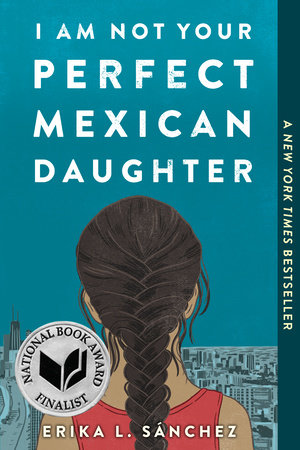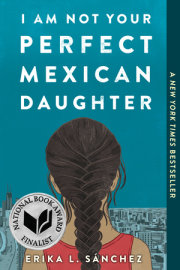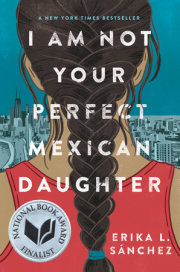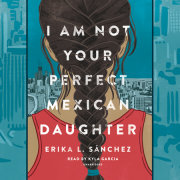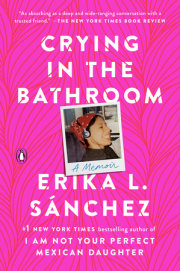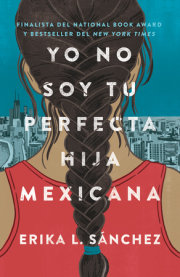What’s surprised me most about seeing my sister dead is the lingering smirk on her face. Her pale lips are turned up ever so slightly, and someone has filled in her patchy eyebrows with a black pencil. The top half of her face is angry--like she’s ready to stab someone--and the bottom half is almost smug. This is not the Olga I knew. Olga was as meek and fragile as a baby bird.
I wanted her to wear the pretty purple dress that didn’t hide her body like all of her other outfits, but Amá chose the bright yellow one with the pink flowers I’ve always hated. It was so unstylish, so classically Olga. It made her either four or eighty years old. I could never decide which. Her hair is just as bad as the dress--tight, crunchy curls that remind me of a rich lady’s poodle. How cruel to let her look like that. The bruises and gashes on her cheeks are masked with thick coats of cheap foundation, making her face haggard, even though she is (was) only twenty-two. Don’t they pump your body full of strange chemicals to prevent your skin from stretching and puckering, to keep your face from resembling a rubber mask? Where did they find this mortician, the flea market?
My poor older sister had a special talent for making herself less attractive. She was skinny and had an okay body, but she always managed to make it look like a sack of potatoes. Her face was pale and plain, never a single drop of makeup. What a waste. I’m no fashion icon--far from it--but I do feel strongly against dressing like the elderly. Now she’s doing it from beyond the grave, but this time it’s not even her fault.
Olga never looked or acted like a normal twenty-two-year-old. It made me mad sometimes. Here she was, a grown-ass woman, and all she did was go to work, sit at home with our parents, and take one class each semester at the local community college. Every once and a while, she’d go shopping with Amá or to the movies with her best friend, Angie, to watch terrible romantic comedies about clumsy but adorable blond women who fall in love with architects in the streets of New York City. What kind of life is that? Didn’t she want more? Didn’t she ever want to go out and grab the world by the balls? Ever since I could pick up a pen, I’ve wanted to be a famous writer. I want to be so successful that people stop me on the street and ask, “Oh my God, are you Julia Reyes, the best writer who has ever graced this earth?” All I know is that I’m going to pack my bags when I graduate and say, “Peace out, mothafuckas.”
But not Olga. Saint Olga, the perfect Mexican daughter. Sometimes I wanted to scream at her until something switched on in her brain. But the only time I ever asked her why she didn’t move out or go to a real college, she told me to leave her alone in a voice so weak and brittle, I never wanted to ask her again. Now I’ll never know what Olga would have become. Maybe she would have surprised us all.
Here I am, thinking all of these horrible thoughts about my dead sister. It’s easier to be pissed, though. If I stop being angry, I’m afraid I’ll fall apart until I’m just a warm mound of flesh on the floor.
While I stare at my chewed-up nails and sink deeper into this floppy green couch, I hear Amá wailing. She really throws her body into it, too. “Mija, mija!” she screams as she practically climbs inside the casket. Apá doesn’t even try to pull her off. I can’t blame him, because when he tried to calm her down a few hours ago, Amá kicked and flailed her arms until she gave him a black eye. I guess he’s going to leave her alone for now. She’ll tire herself out eventually. I’ve seen babies do that.
Apá has been sitting in the back of the room all day, refusing to speak to anyone, staring off into nothing, like he always does. Sometimes I think I see his dark mustache quivering, but his eyes stay dry and clear as glass.
I want to hug Amá and tell her it’s going to be okay, even though it’s not and never will be, but I feel almost paralyzed, like I’m underwater and made of lead. When I open my mouth, nothing comes out. Besides, Amá and I haven’t had that kind of relationship since I was little. We don’t hug and say, “I love you,” like on TV shows about boring white families who live in two-story houses and talk about their feelings. She and Olga were practically best friends, and I was the odd daughter out. We’ve been bickering, drifting away from each other for years. I’ve spent so much of my life trying to avoid Amá because we always end up arguing over stupid, petty things. We once fought about an egg yolk, for instance. True story.
Apá and I are the only ones in my family who haven’t cried. He just hangs his head and remains silent as a stone. Maybe something is wrong with us. Maybe we’re messed up beyond crying. Though my eyes haven’t produced tears, I’ve felt the grief burrow in every cell of my body. There are moments that I feel like I might suffocate, as if all my insides are tied into a tight little ball. I haven’t taken a crap in almost four days, but I’m not about to tell Amá in the state she’s in. I’ll just let it build until I explode like a piñata.
Amá has always been prettier than Olga, even now, with her swollen eyes and splotchy skin, which is not the way it’s supposed to be. Her name is more graceful, too--Amparo Montenegro Reyes. Mothers are not supposed to be more beautiful than their daughters, and daughters are not supposed to die before their mothers. But Amá is more attractive than most people. She hardly has any wrinkles and has these big, round eyes that always look sad and wounded. Her long hair is thick and dark, and her body is still slim, unlike the other moms in the neighborhood who are shaped like upside-down pears. Every time I walk down the street with Amá, guys whistle and honk, which makes me wish I carried a slingshot.
Amá is rubbing Olga’s face and crying softly now. This won’t last, though. She’s always quiet for a few minutes, then, all of a sudden, lets out a moan that makes your soul turn inside out. Now Tía Cuca is rubbing her back and telling her that Olga is with Jesus, that she can finally be in peace.
Copyright © 2017 by Erika L. Sánchez. All rights reserved. No part of this excerpt may be reproduced or reprinted without permission in writing from the publisher.

